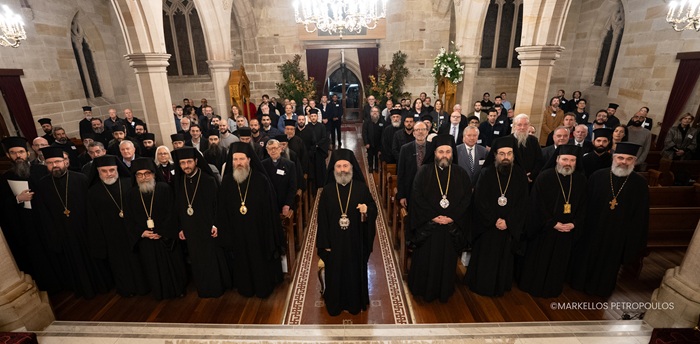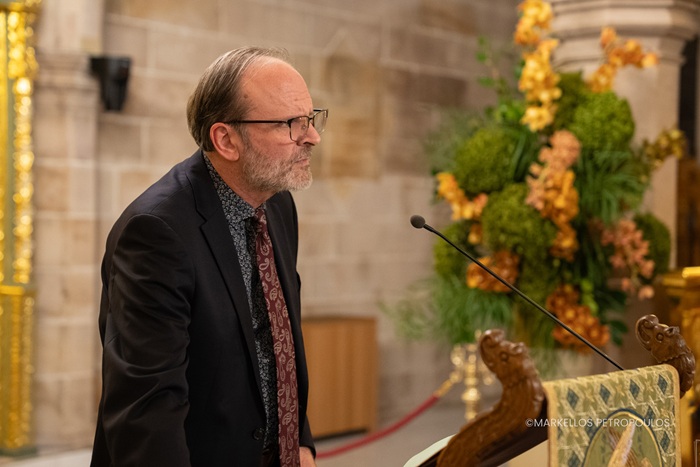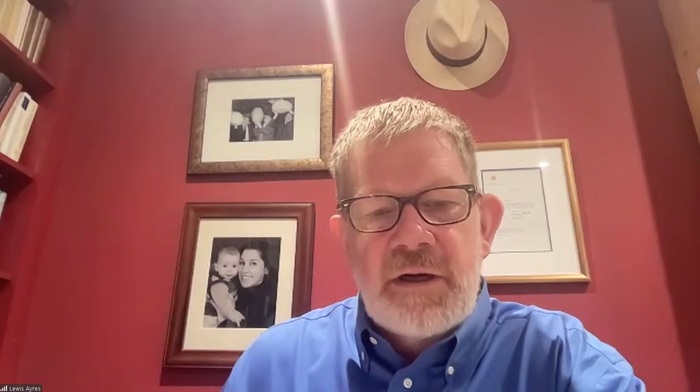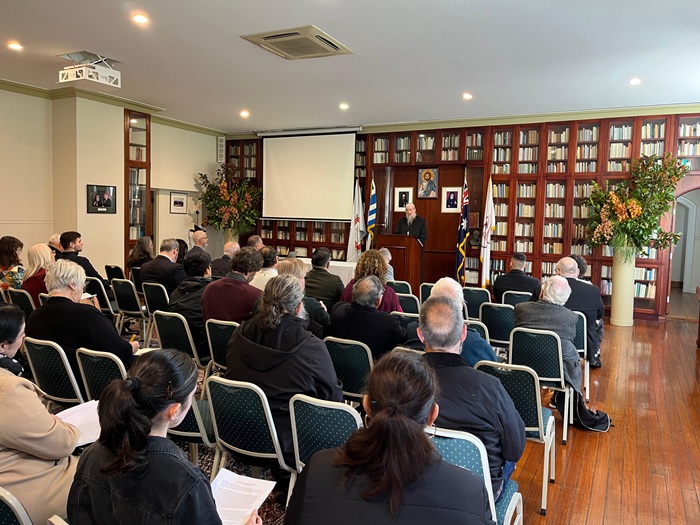- Home
- About us
- Students
- Courses
- Research
- Library
- News & Events
- Gallery
- Contact
- Our Blog
Latest News

St Andrew's Fifth Theology Symposium
Aug 25, 2025
admin
St Andrew's Fifth Theology Symposium
St Andrew’s 5th Theology Symposium Marks 1700 Years Since Nicaea

Sydney, 22–23 August 2025 — More than 120 scholars, clergy, and students gathered at St Andrew’s Greek Orthodox Theological College this weekend for the 5th Theology Symposium, held in collaboration with the New South Wales Ecumenical Council and under the auspices of the Holy Eparchial Synod of the Greek Orthodox Archdiocese of Australia.
In his opening welcome, His Eminence Archbishop Makarios of Australia, President and Dean of the College, set the tone for the Symposium by emphasising that Nicaea is not simply a historical milestone but a living testimony to truth and unity in Christ. He recalled how the 318 Fathers of the Council, “guided by the Holy Spirit, articulated the Church’s faith through the Nicene Creed: a sublime and enduring confession of who Jesus Christ is—our Lord, our God, our Saviour”.
The Archbishop stressed that the Council of Nicaea remains relevant not only for its doctrinal clarity—confessing Christ as “begotten, not made, consubstantial with the Father”—but also for its witness to the Church’s synodical life. “Theology,” he reminded participants, “is never a mere academic exercise; it is a pastoral and ecclesial vocation. Doctrine must be transformed into doxology, and truth must culminate in love”. The Dean also highlighted the ecumenical significance of the event, noting that this year’s collaboration with the NSW Ecumenical Council reflects a shared commitment to Christian unity in a fragmented world.
Preceding the Dean’s address, His All-Holiness Ecumenical Patriarch Bartholomew offered a formal greeting from the Phanar. He praised the Symposium as an “inspired initiative” and a “cause of particular gladness” for the Church in Australia and the wider oikoumene. Reflecting on Nicaea’s enduring witness, he reminded participants that the confession of the Fathers — that Christ is “begotten, not made, and of one essence with the Father” — was not a philosophical theory but “the radiant proclamation of the mystery of salvation.” He described the Council as a “luminous manifestation of the synodical and eucharistic being of the Church” and urged all Christians to see Nicaea not as “a monument enshrined in history, but as a living summons to fidelity, truth, and loving communion in Christ”
Keynote Addresses
The Symposium was enriched by three major keynote lectures from internationally renowned theologians:
Professor Peter Bouteneff (St Vladimir’s Orthodox Theological Seminary, New York) delivered his keynote on The Odyssey of the Homoousion. He traced the history and theological debates surrounding the term homoousios(“of one essence”), the word at the heart of the Nicene Creed. Bouteneff highlighted how its contested meaning was gradually discerned, ultimately shaping the trajectory of Christian theology across the centuries.

Professor Lewis Ayres (Durham University and Pontifical University of St Thomas Aquinas, Rome) opened with a lecture titled Why is Nicaea Important? He explored the continuity between the Creed of Nicaea and earlier rules of faith, and demonstrated how the Creed functions as both a Trinitarian and Christological symbol—showing why it endures as a central expression of Christian identity.

The Very Reverend Professor John Behr FBA (University of Aberdeen) addressed the Symposium on ‘God Stands in the Congregation of God’: Speaking of God Before and After Nicaea. He examined what he called the “metaphysical breakthrough” of Nicaea—moving beyond the idea of God as a supreme being among beings to a deeper vision of the Triune God revealed through the paradox of the Cross.

Together with the three keynote speakers, the Symposium hosted another wide range of scholarly papers. The names of the remaining presenters together with the titles of their presentations were, in order of delivery: Dr Vicki Petrakis, “Athanasius Contra Mundum: the ‘Pillar of the Church’ and Neo-Nicene Politics in the Thought of Gregory Nazianzen”; Dr Peter McGregor, “The Council of Nicaea and the Paradoxes of Faith, with a Focus on False Cataphaticism”; Revd Dr Antonios Kaldas, “Stranger than We Can Imagine: How recent developments in Consciousness Studies revive an ancient anthropology, give us new ways to express Nicene Christology, and make mystery cool again”; A/Prof. Philip Kariatlis, “The Cross as Glory: Divine Manifestation and the Nicene Vision in St Athanasius’ On the Incarnation”; Prof. Neil Ormerod, “The Council of Nicaea and the Status of the Divine Processions”; Dr Samuel Kaldas, “Nicaea and Athanasius in the Theology of Matthew the Poor”; Revd Anastasios Bozikis, “Not With the Jews: Nicaea and the Case for an Uncommon Date of Easter”; Dr Joe Mock, “Zurich and Nicaea: Bullinger and the Trinity”; Bishop Silouan of Adelaide, “The Pro-Nicene Theology, Personality and Legacy of St Basil the Great”; Michael Kuznetsov, “The Council of Nicaea and the Role of Athanasius the Great”; Revd Prof. Demetrios Bathrellos, “Nicaea’s Insights into Primacy and Conciliarity”; Dr James Rutherford, “One God the Father Almighty? Appropriating Augustine’s Exegesis of Deuteronomy 6:4 in Response to the Challenge of Three Gods”; Revd Canon Dr Mark D Thompson, “Nicaea and Holy Scripture”; Revd Dr Rod Benson, “Nicaea and Moral Theology”; Revd Prof. Gerard Kelly, “The Creed of Nicaea and Modern Ecumenical Efforts”; Dr Andrew Mellas, “The First Ecumenical Council of Nicaea in the Liturgical Imagination of Byzantium”; Lawrence Qummou, “Salvific Logic: Nicaea and the God-world Relationship”; and Fr Alexander Aziz with Mr Michael Ibrahim, “The Symbol of Faith as a Symbol of Resistance: Polemical Utility of the Nicene/Constantinopolitan Creed in the Post-Chalcedonian Period”. All presentations created space for scholars of different academic affiliations, denominational backgrounds, and disciplines to reflect together on the continuing theological, ecclesial, and cultural significance of the First Ecumenical Council.
The celebrations will culminate with a Synodal Divine Liturgy at the Cathedral of the Annunciation in Redfern, on Sunday 24 August 2024 presided over by Archbishop Makarios together with the Holy Eparchial Synod.
As Archbishop Makarios reminded participants, the spirit of Nicaea must not remain in the past but must “ignite once again the Christian message”. The 5th Theology Symposium thus stood as both commemoration and renewal, inviting the Church in Australia and beyond to deepen its fidelity to the apostolic faith and its witness of unity in Christ.

.jpg)





.png)